News from Maison de la Gare
Microfinance Opens Doors to the Future
Tweeter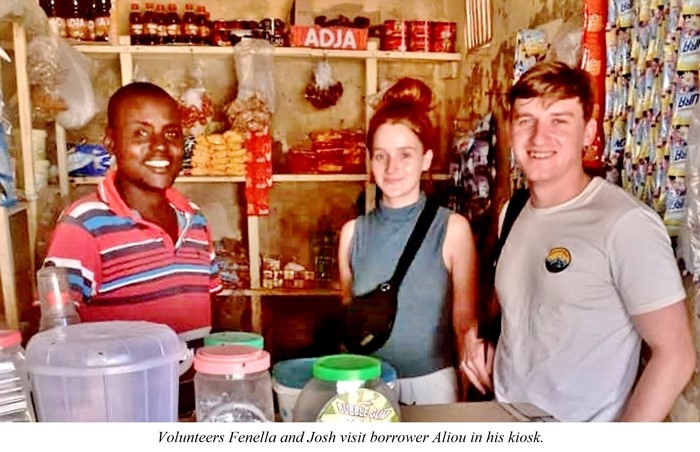
… and volunteers can play an invaluable role
Maison de la Gare has recognized for many years that improving the daily lives
of the begging talibé street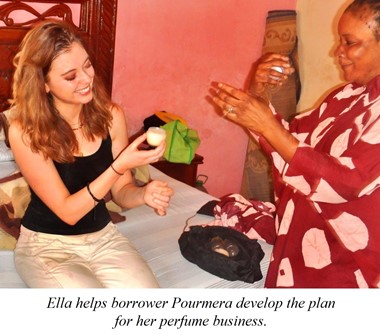 children is not enough. Many of these children have been attending our programs
for over a decade and are now too old to continue in their daaras.
children is not enough. Many of these children have been attending our programs
for over a decade and are now too old to continue in their daaras.
We listened for years to older talibés talking about finding a new life in Europe,
risking the ocean passage to the Canary Islands or across the desert to the Libyan
coast. Many tried, but few were successful. Others spoke of following their main
role models to become marabouts themselves, perpetuating the cycle of abuse and
financial exploitation of young talibés.
Our poultry farming apprenticeship program in nearby Bango was made possible in
2018 by a grant from the U.S. State Department. This was our
first effort to support some older talibés in learning a skill, a trade that
 would allow them to
become self-sufficient in Senegal. This was followed quickly by the tailoring
apprenticeship program located in our center in Saint Louis. However, it was soon
clear that, with hundreds of the talibés maturing every year, this is not enough.
would allow them to
become self-sufficient in Senegal. This was followed quickly by the tailoring
apprenticeship program located in our center in Saint Louis. However, it was soon
clear that, with hundreds of the talibés maturing every year, this is not enough.
When the American non-profit Friends of Senegal approached us in early 2020 about
starting a microfinance program, we jumped at the chance. Here was an opportunity
to support graduates of our apprenticeship programs in establishing themselves,
but also to offer support to many others who had ideas for creating independent
businesses.
After a shaky beginning as we learned how to best select and support borrowers, the
program has thrived.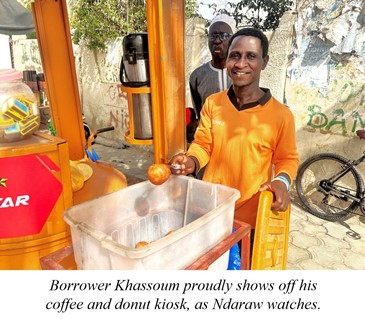 We have granted 121 loans to date.
We have granted 121 loans to date.
Of the 22 loans granted in 2022, 14 were to talibés. Each of these youth has a
vision for a successful business that can be the basis for his financial security.
The scope of proposals made by these aspiring borrowers was inspiring. Three have
established chicken-raising operations. One expanded his small restaurant in which
he hires several talibés as staff. And one of his early talibé employees took a
loan to start his own restaurant. A former talibé is retailing charcoal and animal
feed to local families. Two are selling products as they walk around the different
areas of Saint Louis, one food and the other clothing. One boy, Khassimou, has a
stand selling coffee and donuts while another, Bobo, is operating a very popular
fruit stand. Another youth has started a successful business reselling dried and
smoked fish in nearby villages. And more.
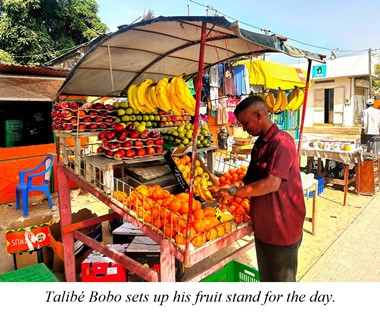
Every one of these borrowers is repaying their loan on schedule, typically over
10 months. We would like to launch many more youth in this way. The limitation
is the time needed to provide business training to potential borrowers, to support
them as they develop business proposals that can be financed, and to follow them
and support them as they pursue their projects. Volunteers can have an enormous
impact here. They will be able to inspire hope and expectation of a brighter future
for these older talibés who have lived all their youth in the harsh conditions of
learning and begging in the streets.
At a recent loan committee meeting, English volunteers Fenella, Josh and Ella
each presented a loan proposal that they had developed with a potential borrower.
All three proposals were accepted.
The borrower that Ella worked with, Pourmera, is a young, divorced
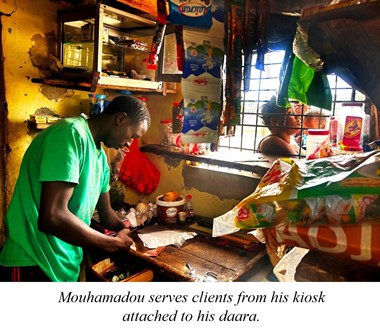 woman who runs
a business based on selling accessories for women. We have
included female borrowers in our program both to represent the full community
and to provide models of successful entrepreneurship for our talibé borrowers.
woman who runs
a business based on selling accessories for women. We have
included female borrowers in our program both to represent the full community
and to provide models of successful entrepreneurship for our talibé borrowers.
The loans that we have made to date represent just a beginning of this effort to
set older talibés on a secure footing for the future, for their financial independence.
We are grateful to the volunteers who have helped and look forward to welcoming many more.
They contribute to protecting children's rights for a better future.

